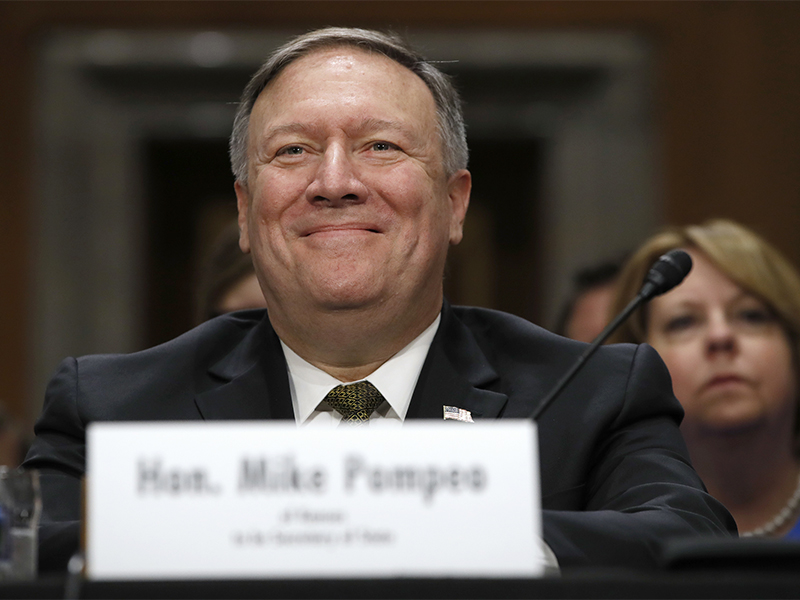(RNS) — As members of the Senate Foreign Relations Committee begin hearings on whether to confirm Mike Pompeo as secretary of state, they will consider dozens of objections from Muslim groups — and a number from prominent Jewish ones.
Both accuse him of maligning Muslims.
Pompeo, the outgoing CIA director whom President Trump nominated to replace Rex Tillerson for the top diplomatic post, has a record of anti-Muslim remarks and has been associated with anti-Muslim conspiracy theorists. His confirmation hearings begin Thursday (April 12).
Among his most troubling remarks: Pompeo’s false accusation that U.S. Muslim leaders remained silent after the Boston Marathon bombing five years ago, and his suggestion that they were “potentially complicit” in the bombing.
For years, many Jews and Muslims have found themselves on opposite sides of contentious foreign policy questions relating to the Israeli-Palestinian conflict. Their alliance against Pompeo may surprise some, but the Jewish groups say they feel compelled to question the nomination.
Among those expressing deep concerns about Pompeo’s confirmation are the American Jewish World Service, the Anti-Defamation League and the National Council of Jewish Women.
The ADL issued senators a series of questions it would like them to ask Pompeo. For example:
- “Will you affirm that Islam, as practiced by the vast majority of American Muslims, is fundamentally compatible with democracy and commit to not calling this affirmation into question in the future?”
- “Will you disavow your repeated insinuation that non-Muslims should fear the intentions of their Muslim neighbors, and will you commit to not spreading that calumny again?”
Other Jewish groups, such as the American Jewish World Service, went on the record opposing his confirmation.
“As Jews, we clearly have been victims of sanction, prejudice and coercion ourselves,” said Robert Bank, president and CEO of American Jewish World Service, a human rights organization. “We identify with other marginalized groups and oppose the nomination of anyone who would pursue policies of prejudice and intolerance.”
The thrust of Pompeo’s remarks about Muslims that have drawn the most ire revolve around the idea that Islam is an inherently violent religion and that most U.S. Muslim organizations want to replace American law with Islamic law, known as Shariah.
“There are organizations and networks here in the United States tied to radical Islam in deep and fundamental ways,” Pompeo said in a 2015 interview on a radio program hosted by Frank Gaffney Jr., an anti-Muslim conspiracist. “They’re not just in places like Libya and Syria and Iraq, but in places like Coldwater, Kansas, and small towns all throughout America.”
Scores of Muslim groups have objected to Pompeo’s confirmation. Muslim Advocates, the Muslim Public Affairs Council, the Arab American Institute, the American-Arab Anti-Discrimination Committee and others have sent letters to the members of the Foreign Relations Committee pointing out Pompeo’s record of anti-Muslim statements.
Many Muslims, Jews and Christians have also challenged Pompeo’s opposition to the Iran nuclear deal, his past support for waterboarding and other forms of torture, and his opposition to gay marriage. (Pompeo opposed the Supreme Court ruling allowing same-sex marriage and the repeal of the “don’t ask, don’t tell” policy on military service by LGBTQ people.)
This is not the first time in recent years that Muslims and Jews have joined together to advance a shared public policy aim or come to one another’s aid when either has been the victim of a hate crime. In addition to opposing some of the Trump administration’s appointments, they have also united around the travel ban policy as well as the administration’s crackdown on undocumented residents.
“It’s been really heartening to see that there have been so many different groups coming forward, whether it’s religious groups or civil rights organizations and all sorts of advocacy groups,” said Madihha Ahussain, special counsel for anti-Muslim bigotry at Muslim Advocates, a national legal advocacy and educational organization that opposes Pompeo’s nomination.
While tensions persist between American Jews and Muslims, Jill Jacobs, executive director of T’ruah: The Rabbinic Call for Human Rights, said there’s been growing recognition that the two faiths can work together.
“On the local level, we’re hearing about on-the-ground cooperation that’s happening between Jews and Muslims,” whether it’s a Jewish congregation supporting Muslims after an attack on a mosque or Muslims supporting Jewish victims of hate crimes, Jacobs said.
Pompeo’s remarks before the Senate Foreign Relations Committee on Thursday will be the first chance for lawmakers and the public to hear from the former Kansas congressman about how he would handle the job of secretary of state. He will need bipartisan support to move the nomination to the Senate floor.
Republicans have a narrow 11-10 majority on the committee. Republican Rand Paul of Kentucky, a member of the committee, has come out against Pompeo.





